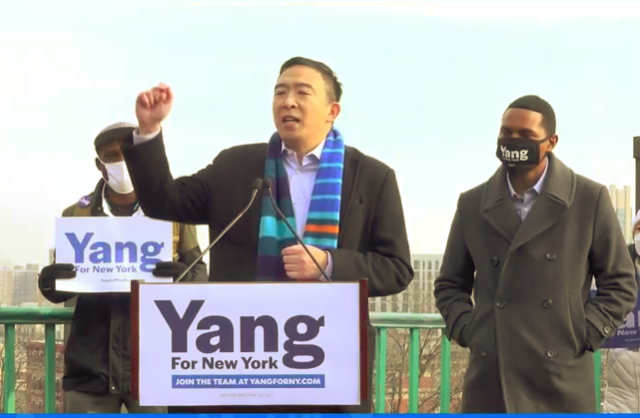The tech entrepreneur and former presidential candidate promises a ‘fact-based’ government and universal income.

YouTube
Andrew Yang, flanked by campaign co-chair Rep. Ritchie Torres, at his announcement event in Morningside Park.There is nothing older or more conventional in New York City politics than the argument that new ideas and unconventional candidates will save us.
That was one of the talking points for Rudy Giuliani, a prosecutor who had never held elected office, when he first ran for mayor in 1989. It was one of the selling points for Michael Bloomberg, a business leader who had never held elected office, in 2001. They billed themselves as outsiders who offered innovation, competence and a break from the tired politics of the Democratic establishment.
In ideology and temperament, Democrat Andrew Yang is a vastly different politician from either of those past Republican mayors. But he rode a similar argument into the 2021 mayoral race on Thursday as he announced his candidacy with a brief, boisterous appearance in Manhattan’s Morningside Park.
“What we need is an escape from the absurdity of New York City politics. What we need is an infusion of new ideas and new energy and new leadership and what I have found in Andrew Yang is a leader who represents a break from the failed politics of the past,” Rep. Ritchie Torres, a co-chair of Yang’s mayoral run, said. “Andrew has the unique capacity to be a unifying figure at a time of division … to be an inspirational problem-solver and policymaker at a time of performative politics. He’s exactly the transformative leader we need at our moment of greatest crisis.”
Yang, a resident for 25 years whose decision to leave the city amid COVID-19 has exposed him to early criticism, described a deep connection to New York: the feeling of “joining the center of the world” when he arrived, the memory of walking north from the Twin Towers on September 11th, or welcoming a new child in the aftermath of Superstorm Sandy.
A lawyer who shifted from corporate litigation to start-ups, built a test-prep company and moved into the nonprofit sector before his run for president “turned into a movement with millions of Americans rallying around universal basic income and a new economy that works for us, the people,” he declared. “I am running for mayor for a very simple reason: I see a crisis and believe that I can help.”
“One million New Yorkers are out of work and the city’s unemployment rate is double the national average. Whole sectors of the economy are shut down,” Yang continued. “The fears for our future that caused me to run for president have accelerated since this pandemic started and those numbers don’t even reflect how much worse Black and brown New Yorkers have been hit by this crisis.”
He promised “a city government focused on competence and delivering for our people every day,” and said, “we need to rebuild New York not as it was but as it deserves to be.” To do that, he said he’d offer a “positive vision for New York City and a rational, progressive plan to implement it” as well as “a fact-based government that puts results over politics.”
Yang said his goal was not just the city’s comeback from COVID but also a sustained effort to reduce poverty. He promised to launch the largest basic income program anywhere in the country.
“Cash relief is literally the difference between a family having enough to eat and going hungry, between being homeless and having a roof over their head,” he said.
He also promised to help 15,000 businesses reopen during his first year in office, to hold police accountable both for reducing crime and respecting civil rights, improve broadband access and to move to establish municipal control over the transit system.
“We’ll also launch a people’s bank that makes financing available to working people and small businesses across our five boroughs so they don’t have to run to check cashers or money lenders that charge exorbitant rates,” Yang said. In a nod to complaints from the city’s nonprofit sector about egregious delays in getting paid for the services they perform under city contracts, he vowed that under his administration, “the city will pay its bills on time.”
Dropping names from his presidential run, he claimed President-Elect Joe Biden, Vice President-Elect Kamala Harris and Transportation Secretary-designate Pete Buttigieg as friends. Vowing that his administration would have “a strong voice in Washington, D.C.,” Yang promised: “These relationships will pay dividends for our city when we want to get things done.”
Yang is a late entry to a crowded field, but he brings name recognition and a base of passionate supporters from his 2020 national campaign. The question is whether that will be enough to overcome the years of groundwork laid by Comptroller Scott Stringer or Brooklyn Borough President Eric Adams, or the appeal of the many other Democrats in the race. The impact that ranked-choice voting will have on the race is hard to predict.
Yang’s proposal for universal basic income is the kind of big idea that successful campaigns are often built around (see “universal pre-kindergarten” circa 2013) but it’s not the only innovative idea being proposed on the mayoral landscape. Contrary to the notion that this race now pits one outsider against a field of carbon-copy establishment candidates, the other candidates in the race reflect a mix of backgrounds and ideologies. Most of them—like Yang—have never held elected office before.
While expected, Yang’s joining the field is the second jolt to the race this week: The other was Ray McGuire, the former Citigroup banker and another political outsider, announcing that he had raised $5 million just since announcing his run on Dec. 1. That’s 10 times the $458,000 Stringer has said he brought in over the most recent filing period. Former Sanitation Commissioner Kathryn Garcia says she raised $300,000.
By Friday, Yang, Adams, Stringer, Garcia, McGuire and the other candidates in the field—former HUD Secretary Shaun Donovan, ex-Marine and social entrepreneur Zach Iscol, City Councilmember Carlos Menchaca, nonprofit leader Dianne Morales, retired Gen. Loree Sutton, contractor Jocelyn Taylor, former mayoral counsel Maya Wiley and attorney Isaac Wright—must officially report their fundraising results.
Those figures will hint at each candidate’s ability to sustain a campaign over the next several months, and—for those who are participating in public financing—indicate whether they will receive matching funds to do so.
Read more on this: Who’s Who in the Race for New York City Mayor









